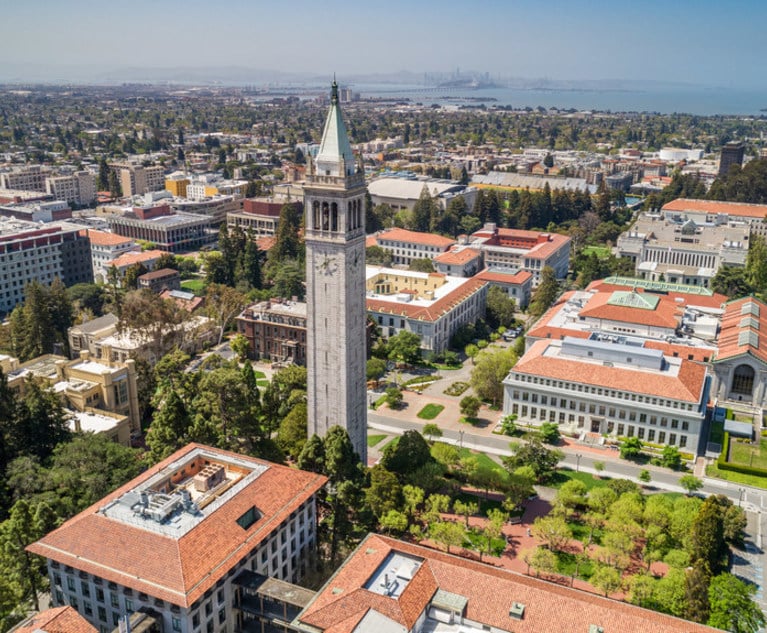100-Plus UC Hastings Students and Alums Sign on to Letter Criticizing the Law School's Role in Tenderloin Lawsuit
The 125-plus signatories to the letter say the high profile lawsuit against the city of San Francisco "defines the community in a way that implicitly excludes our unhoused neighbors." UC Hastings Dean David Faigman said that the school's goals in the lawsuit are "quite aligned" with those of the signatories and that he plans to respond to them in writing.
May 28, 2020 at 07:27 PM
5 minute read
 Homeless camp on Eddy and Taylor in San Francisco's Tenderloin on April 3, 2020. Photo: Jason Doiy/ALM
Homeless camp on Eddy and Taylor in San Francisco's Tenderloin on April 3, 2020. Photo: Jason Doiy/ALM
A group of more than 125 students and alumni of the University of California, Hastings College of the Law have signed onto a letter to Chancellor and Dean David Faigman criticizing the school's lawsuit against the city of San Francisco seeking to address conditions on the streets in the Tenderloin neighborhood it calls home.
The letter, penned by a group of eight current students, most of whom have worked with public defenders offices as part of the school's criminal practice clinic, claims that the lawsuit brought on behalf of the school, local residents and business "defines the community in a way that implicitly excludes our unhoused neighbor."
"We believe this suit will displace the Tenderloin's houseless population and distribute it throughout San Francisco, limiting these individuals' ability to organize and support one another," the letter says. "We also believe the City will use this suit to justify increased police repression of our unhoused neighbors, many of whom are people with disabilities, African American, and Latinx people displaced from their homes by economic and political violence."
Faigman in a phone interview Thursday said that the goals of the letter writers were "quite aligned" with what the school is seeking to accomplish through the lawsuit. But he added that the letter-writers "misunderstand" the litigation and that he plans to respond to them in writing.
"As law students and lawyers well understand, a lawyer has to represent the interest of his or her client," Faigman said. The dean added that homeless residents of the Tenderloin weren't included among the plaintiffs not because of any sense of "animus," but because the homeless are "differently situated" than the plaintiff residents and business.
"I agree that the houseless have needs that need to be attended to, and I do believe that the outcome that we seek will benefit the houseless and the housed in the Tenderloin," Faigman said.
The school joined other residents and businesses in the city's Tenderloin neighborhood earlier this month claiming in a federal lawsuit that San Francisco officials have allowed the Tenderloin to become "a containment zone" for drug and homelessness issues—issues further complicated by the COVID-19 pandemic. The suit claims that the increase of people living on neighborhood streets in recent months has combined with the open-air drug sales in the neighborhood to make conditions "insufferable." Faigman said Thursday comments he's received in support of the lawsuit have outnumbered critical ones 100-to-1.
The open letter, however, claims that the school's approach would invite the city to treat the homeless as criminals. "As UC Hastings students and alumni invested in an equitable future for all Tenderloin residents, we believe our school should meaningfully challenge the social, economic, and political conditions that create and perpetuate homelessness," the letter said. "Doing so requires breaking the cycle of the failed 'war on drugs' and the gentrification that has forced so many of our houseless neighbors onto the streets."
Abel Mouton, one of the letter's authors who is in the class of 2021 at the school, said that the lawsuit should probably name San Francisco Mayor London Breed since she ignored a unanimous vote by the city's board of supervisors last month to house the city's homeless in hotels during the pandemic. "UC Hastings must realize that the relief sought from the lawsuit will have lasting effects on the Tenderloin community if [people experiencing homelessness] are displaced to the City's jails," the letter says. "By not criminalizing our unhoused neighbors, UC Hastings may begin to live up to its social justice values."
Faigman said Thursday that, ultimately, he thinks city officials, the school and the letter's signatories share a similar vision for the neighborhood where the unhoused can find shelter and access to sanitation and health care and where neighborhood streets are safe for residents and local businesses.
"Ultimately for me the bottom line is this is a political fraught problem there are rights and interest on every side including the city, the homeless and the residents and we need a strong federal judge, and I think we've got one with Judge [Jon] Tigar that is able to take into account all the rights and interests involved and come to a short and long-term solution," Faigman said.
Read the Open letter:
Read more:
San Francisco and UC Hastings to Talk Settlement in Lawsuit Over Tenderloin Conditions
This content has been archived. It is available through our partners, LexisNexis® and Bloomberg Law.
To view this content, please continue to their sites.
Not a Lexis Subscriber?
Subscribe Now
Not a Bloomberg Law Subscriber?
Subscribe Now
NOT FOR REPRINT
© 2025 ALM Global, LLC, All Rights Reserved. Request academic re-use from www.copyright.com. All other uses, submit a request to [email protected]. For more information visit Asset & Logo Licensing.
You Might Like
View All
Lawsuit Accuses University of California of Racial Discrimination in Admissions
4 minute read
Assessing the Second Trump Presidency’s Impact on College Sports


LSAT Administrator Sues to Block AI Tutor From Using ‘Famous, Distinctive’ Test Prep Materials
3 minute readTrending Stories
- 1Munger, Gibson Dunn Billed $63 Million to Snap in 2024
- 2January Petitions Press High Court on Guns, Birth Certificate Sex Classifications
- 3'A Waste of Your Time': Practice Tips From Judges in the Oakland Federal Courthouse
- 4Judge Extends Tom Girardi's Time in Prison Medical Facility to Feb. 20
- 5Supreme Court Denies Trump's Request to Pause Pending Environmental Cases
Who Got The Work
J. Brugh Lower of Gibbons has entered an appearance for industrial equipment supplier Devco Corporation in a pending trademark infringement lawsuit. The suit, accusing the defendant of selling knock-off Graco products, was filed Dec. 18 in New Jersey District Court by Rivkin Radler on behalf of Graco Inc. and Graco Minnesota. The case, assigned to U.S. District Judge Zahid N. Quraishi, is 3:24-cv-11294, Graco Inc. et al v. Devco Corporation.
Who Got The Work
Rebecca Maller-Stein and Kent A. Yalowitz of Arnold & Porter Kaye Scholer have entered their appearances for Hanaco Venture Capital and its executives, Lior Prosor and David Frankel, in a pending securities lawsuit. The action, filed on Dec. 24 in New York Southern District Court by Zell, Aron & Co. on behalf of Goldeneye Advisors, accuses the defendants of negligently and fraudulently managing the plaintiff's $1 million investment. The case, assigned to U.S. District Judge Vernon S. Broderick, is 1:24-cv-09918, Goldeneye Advisors, LLC v. Hanaco Venture Capital, Ltd. et al.
Who Got The Work
Attorneys from A&O Shearman has stepped in as defense counsel for Toronto-Dominion Bank and other defendants in a pending securities class action. The suit, filed Dec. 11 in New York Southern District Court by Bleichmar Fonti & Auld, accuses the defendants of concealing the bank's 'pervasive' deficiencies in regards to its compliance with the Bank Secrecy Act and the quality of its anti-money laundering controls. The case, assigned to U.S. District Judge Arun Subramanian, is 1:24-cv-09445, Gonzalez v. The Toronto-Dominion Bank et al.
Who Got The Work
Crown Castle International, a Pennsylvania company providing shared communications infrastructure, has turned to Luke D. Wolf of Gordon Rees Scully Mansukhani to fend off a pending breach-of-contract lawsuit. The court action, filed Nov. 25 in Michigan Eastern District Court by Hooper Hathaway PC on behalf of The Town Residences LLC, accuses Crown Castle of failing to transfer approximately $30,000 in utility payments from T-Mobile in breach of a roof-top lease and assignment agreement. The case, assigned to U.S. District Judge Susan K. Declercq, is 2:24-cv-13131, The Town Residences LLC v. T-Mobile US, Inc. et al.
Who Got The Work
Wilfred P. Coronato and Daniel M. Schwartz of McCarter & English have stepped in as defense counsel to Electrolux Home Products Inc. in a pending product liability lawsuit. The court action, filed Nov. 26 in New York Eastern District Court by Poulos Lopiccolo PC and Nagel Rice LLP on behalf of David Stern, alleges that the defendant's refrigerators’ drawers and shelving repeatedly break and fall apart within months after purchase. The case, assigned to U.S. District Judge Joan M. Azrack, is 2:24-cv-08204, Stern v. Electrolux Home Products, Inc.
Featured Firms
Law Offices of Gary Martin Hays & Associates, P.C.
(470) 294-1674
Law Offices of Mark E. Salomone
(857) 444-6468
Smith & Hassler
(713) 739-1250






